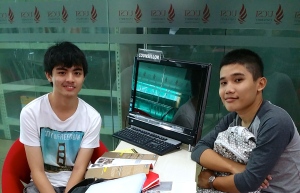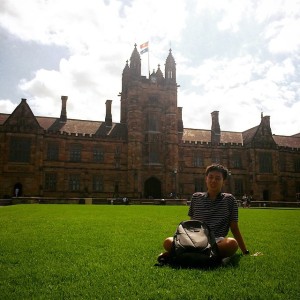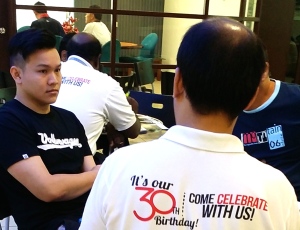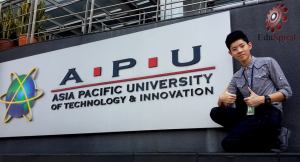Should I choose to Study Form 6 or other Pre-University Course in Malaysia?
Sijil Tinggi Persekolahan Malaysia (STPM) is Malaysia's version of the UK's GCE A-Levels and is a Pre-University course
recognised for entry into public universities in Malaysia. The STPM is also accepted for entry into private universities in Malaysia and overseas universities.
The STPM is acknowledged as one of the toughest exams.
The other way is the Matriculation course where only 10% of the seats are set aside for Non-bumis therefore the competition will be extremely high for the spots.
The STPM is set and run by the Malaysian Examinations Council since 1982, which also runs the Malaysian University English Test (MUET) since 1999.
All students who have passed the Sijil Pelajaran Malaysia (SPM) are eligible to enter into Form 6 to take the STPM, and will be automatically assigned a place in a government secondary school after the release of the SPM results.
The examination body, Majlis Peperiksaan Malaysia (www.mpm.edu.my), allows students to enroll for the examination with a minimum of one (1) subject and a maximum of five (5) subjects (including General Studies). The intake for Form 6 is in May of each year.
Most students take STPM after attending two years of Form 6 (Lower 6 and Upper 6) at a government or private secondary school.
Entry Requirements into Form 6 in Malaysia
SYARAT-SYARAT KELAYAKAN MASUK KE TINGKATAN ENAM BAWAH
Murid-murid dari sekolah kerajaan yang layak ditawarkan masuk ke Tingkatan Enam Bawah 2013 hendaklah memenuhi tiga-tiga
syarat berikut:
1. Memperoleh kepujian bagi mata pelajaran Bahasa Melayu dalam peperiksaan SPM 2012.
1. Memperoleh kepujian bagi mata pelajaran Bahasa Melayu dalam peperiksaan SPM 2012.
2. (A) Untuk kemasukan ke jurusan KEMANUSIAAN, calon mesti memperolehi TIGA kepujian dan jumlah mata gred tidak melebihi 8 unit bagi TIGA mata pelajaran terbaik . Tiap-tiap satunya hendaklah daripada kumpulan yang berlainan dari kumpulan-kumpulan berikut:
KUMPULAN MATA PELAJARAN
I Bahasa Melayu
II Bahasa Inggeris
III Kesusasteraan Melayu / Kesusasteraan Inggeris
IV Sejarah
V Geografi / Pendidikan Seni Visual
VI Pendidikan Islam / Pendidikan Moral
VII Matematik / Matematik Tambahan
VIII Sains / Sains Tambahan / Applied Science
IX Salah Satu Mata Pelajaran Teknik/Vokasional/Mata Pelajaran Vokasional (MPV)
X Tasawwur Islam/Pendidikan Al Quran Dan Al Sunnah/Syariah Islamiah
XI Bahasa Arab Tinggi / Bahasa Arab (Komunikasi) / Bahasa Cina / Bahasa Tamil
XII Sains Pertanian / Perdagangan / Prinsip Perakaunan / Ekonomi Asas / Ekonomi
Rumah Tangga / Pengetahuan Sains Sukan
I Bahasa Melayu
II Bahasa Inggeris
III Kesusasteraan Melayu / Kesusasteraan Inggeris
IV Sejarah
V Geografi / Pendidikan Seni Visual
VI Pendidikan Islam / Pendidikan Moral
VII Matematik / Matematik Tambahan
VIII Sains / Sains Tambahan / Applied Science
IX Salah Satu Mata Pelajaran Teknik/Vokasional/Mata Pelajaran Vokasional (MPV)
X Tasawwur Islam/Pendidikan Al Quran Dan Al Sunnah/Syariah Islamiah
XI Bahasa Arab Tinggi / Bahasa Arab (Komunikasi) / Bahasa Cina / Bahasa Tamil
XII Sains Pertanian / Perdagangan / Prinsip Perakaunan / Ekonomi Asas / Ekonomi
Rumah Tangga / Pengetahuan Sains Sukan
Calon-calon yang memperolehi jumlah mata gred 9 hingga 12 unit bagi TIGA mata pelajaran terbaik daripada TIGA kumpulan yang berlainan seperti tercatat dalam 2(A), layak ditawarkan ke Tingkatan Enam Bawah dengan syarat terdapat kekosongan tempat di sekolah berkenaan.
ATAU
2. (B) Untuk kemasukan ke jurusan SAINS, calon mesti memperoleh sekurang- kurangnya TIGA kepujian dengan jumlah mata gred yang tidak melebihi 14 unit. Tiap-tiap satunya hendaklah dalam kumpulan yang berlainan dari kumpulan-kumpulan berikut:
KUMPULAN MATA PELAJARAN
I Matematik / Matematik Tambahan
II Fizik
III Kimia
IV Biologi
I Matematik / Matematik Tambahan
II Fizik
III Kimia
IV Biologi
V Lukisan Kejuruteraan / Kejuruteraan Mekanikal / Kejuruteraan Awam / Kejuruteraan Elektrik & Elektronik/ Rekacipta Teknologi Kejuruteraan / Teknologi Maklumat / Pengajian Agroteknologi / Pengurusan Makanan / Pengajian Pakaian.
Calon-calon yang memperolehi jumlah mata gred 15 hingga 18 unit bagi TIGA mata pelajaran terbaik daripada TIGA kumpulan yang berlainan seperti tercatat dalam 2(B), layak ditawarkan ke Tingkatan Enam Bawah dengan syarat terdapat kekosongan tempat di sekolah berkenaan.
Should I study Form Six?
In order to consider studying Form 6, students should take the time to understand the system and how Form 6 works.
Let's look at the statistics below to help you decide whether you should take Form 6 or not.
There were 58,355 students who took STPM in 2013 and in 2014 it dropped to 48,615 students. It is a drop of 16.69% (9,740 candidates)
48,615 candidates registered for the STPM examinations in 2014 but only 42,854 sat for it. Only 390 out of 48,615 STPM 2014 obtained a 4.0 CGPA. 57 candidates failed the exam.
The national CGPA was 2.62 but for non-bumis to get their courses of choice, you will need higher CGPA. Ten students scored 5As, and a total of 398 students scored 4As. To obtain scholarships from private universities or overseas, you need to score 4As or 5As, so based on this, you can calculate the chances of you scoring in the STPM and obtaining a scholarship.
27,342 (63.80%), passed in four subjects, 7,130 in three subjects, 3,563 in two subjects and 2,410 passed just one subject. Pass here includes D and E. You need at least 2 Cs to join a degree course in private universities.
The number of candidates achieving 4 Principals (C) in STPM 2014 is 60.14 per cent. You need at least 2 Principals to join a degree course in private universities.
Duration of Form 6 studies
In the new system, the duration of form six studies is similar to the previous system which is based on one-and-a half years of form six studies comprising the lower and upper six form.
The allocation of teaching periods remains the same: eight periods per week for each subject (one period = 40 minutes).
Subjects for STPM
There are two streams, which are the Arts Stream and the Science Stream.
- 900 General Studies
- 910 Malay Language
- 911 Chinese Language
- 912 Tamil Language
- 913 Arabic Languange
- 920 Literature in English
- 922 Communicative Malay Literature
- 930 Syariah
- 931 Usuluddin
- 940 History
- 942 Geography
- 944 Economics
- 946 Business Studies
- 948 Accounting
- 950 Mathematics (M)
- 954 Mathematics (T)
- 956 Further Mathematics
- 958 Information and Communications Technology
- 960 Physics
- 962 Chemistry
- 964 Biology
- 966 Sports Science
- 970 Visual Arts
Modular System for the STPM
The new modular STPM format began in 2012, will combine two forms of assessments, and will be similar to the A levels format
except that it will be in BM.
Students will go through a school-based assessment with a weighting of 20-40% of the final score and a centralised examination with a weighting of 60-80% of the final score (The weighting varies according to subjects).
Nevertheless, School Based Assessment (SBA) cannot be repeated and repeaters are required to sit for an alternative written paper in place with SBA.
The curriculum is divided into three parts based on topic areas. Each part will be taught and studied in either the first, second or third term.
You will take the examinations at the end of each term (3 in total). One term is 6 months. Students who are not satisfied with their
results for the first two terms can retake the examinations at the end of the third term.
Students’ assessment will be carried out each term with the results being released at the end of each respective term. The overall STPM results will be based on the best combined results of the three terms.
Soft skill such as communication skills, teamwork, leadership, critical thinking, problem solving,information management and ethics are included in the new curriculum.
School-Based Assessment (SBA) for the STPM
The introduction of SBA in this system is in line with the aspiration of the Education
Ministry to develop human capital who embrace intellectual, emotional, spiritual, and physical values in line with the National Educational Philosophy.
The SBA consists of project work, field study and practical work. The coursework question/task is prepared by the Council and will be conducted either over three terms or as determined by the individual subject requirements.
Examination
A centralised written examination is administered at the end of each term. Question
types consist of multiple choice, structed and essay questions. Question papers are prepared and provided by the Council, and the marking of answer scripts will be carried out by Council-appointed examiners.
Please fill up the form for more information. If you do not give your mobile number or full name as in IC, your query will not be answered. Please make sure you give a correct email address and check your email including the SPAM or JUNK email folder within 48 hours as we will email you the information.
[contact-form subject='[EduSpiral Consultant Services - Education advise on the best universities %26amp; colleges in Malaysia%26#x002c; Hong Kong%26#x002c; Singapore and UK The top universities and colleges in Malaysia offering the best courses'][contact-field label='Full Name as in IC. (If you are the parent%26#x002c; please give the child%26#039;s name)' type='name' required='1'/][contact-field label='Email' type='email' required='1'/][contact-field label='Hand Phone Number' type='text' required='1'/][contact-field label='Qualification (SPM%26#x002c; A-Levels%26#x002c; STPM%26#x002c; UEC%26#x002c; etc)' type='text'/][contact-field label='Course of Interest/Remark' type='textarea' required='1'/][/contact-form]
STPM Grading System
The grading system in the new STPM assessment system is similar to that of the previous STPM system. The score (question paper level) acquired by students for each term will be aggregated to determine the overall subject grade.
There is no prerequisite minimum pass grade in each term for students to qualify to continue their studies in the following term.
- After I finished my SPM, I felt confused about my further study. Because of Eduspiral, I am able to pursue my studies at Asia Pacific University.
Eduspiral, was so patient to answer all my questions and even brought me to visit the university when I went to KL alone.
Jeremy Lee, APU scholarship student
STPM uses a Cumulative Grade Point Average (CGPA) system. There are 11 grades, which are A, A-, B+, B, B-, C+, C, C-, D+ and D, with F as the failing grade. The grade points for each of these grades are between 4.0 and 1.0, A being 4.0 and D- being 1.0.
The F grade gives a grade point of 0. From year 2012 onwards, CGPA point for each subject is known as Subject Grade Point (SGP) meanwhile the overall CGPA point for all subjects will be known as "Overall Subject Grade Point".
In accordance with the implementation of modular system in STPM from year 2012 onwards, MEC will implement a new assessment system for each STPM subjects.
Cumulative and subject GPA at 2.0 and above is considered a pass with credit or principal pass.
GPA below 2.0 is considered a sub-fail, and a 0 is considered a fail. Admissions to local public universities requires at least a CGPA of 2.0 and above.
| Paper Grade | Subject Grade | SGP* | Status |
| A | A | 4.00 | Full Pass |
| A- | A- | 3.67 | Full Pass |
| B+ | B+ | 3.33 | Full Pass |
| B | B | 3.00 | Full Pass |
| B- | B- | 2.67 | Full Pass |
| C+ | C+ | 2.33 | Full Pass |
| C | C | 2.00 | Full Pass |
| C- | C- | 1.67 | Partial Pass |
| D+ | D+ | 1.33 | Partial Pass |
| D | D | 1.00 | Partial Pass |
| F | F | 0.00 | Fail |
*Subject Grade Point (SGP)
Advantages of the STPM
With School Based Assessment, teaching and learning are integrated with assessment.
SBA humanises assessment making schooling a cooperative enterprise between teachers and students.
Through the new examination system, students will also have more opportunities to obtain better results. Students are allowed to improve on their first term and second term results by retaking these term examinations at the end of the third term. Students who do not obtain satisfactory results for the third term may also re-sit it.
Disadvantages of the STPM
Lower 6 used to be called the honeymoon year, but now, as soon as you enter Lower 6 you will have to hit the books because
your first exam will be in December and you will have not much time to study and the teachers do no have enough time to cover the material as well. There is no rest as you will need to keep studying the exams every 6 months.
To enter into most private universities, students must achieve at least a CGPA of 2.00 or at least 2 Principal Cs in the relevant subjects. A C- is not a principal and some universities do not accept the Pengajian Am as entry into the university.
STPM requires you to take in too much information in 1.5 years. That in itself shows the inadequacies of a system which doesn’t give enough time for students to consume the information required. Furthermore, STPM needs a lot of study time in order to score well. If you are not ready to commit the time and effort, you should consider other options.
From the time you enter Form 6 till the exam and getting into IPTA would be 2 years. If you had taken a diploma, you would have already completed it. There are 180,000 graduates each year and competition for jobs are high therefore the faster you graduate, the faster you get a job and start your savings.
English is very important to secure a job as well as getting a higher salary and faster promotions. This is reported in the Star and from research conducted by the Ministry of Higher Education in Malaysia.
The medium of instruction in IPTA is in BM and most of the Chinese there communicate in Mandarin. In 2011, 70,000 IPTA graduates were unemployed.
Personally, I only recommend the STPM if students do not have the finances to study in private universities but with the PTPN
Loan, studying in the private colleges or universities are more accessible.
A lot students and parents want to save money by going for the STPM but do not realise that for some, in the end, they are wasting time and eventually have to spend more money.
When you pay for the A-Levels, you get good lecturers who will guide you to score so that you can apply for more scholarships. A-Level graduates from HELP University, UCSI University, KDU University College, KDU College Penang and KBU International College have obtained scholarships into top ranking universities worldwide.
The STPM is extremely tough and if you do not do well, you would have wasted 2 years of your life and time is money. The earlier you graduate and join the work force, the more work experience you can gain and add this to your resume where it translates into higher salary.
If you take a diploma, you would have finished it at the same time you would have taken to complete Form 6.
Students say they cannot afford but for example, the Diploma in Business at KBU International College costs only RM22,560 total for 2 years and can apply RM16,000 total for the PTPN Loan.
KBU is very affordable and value for money. Furthermore, even if you do well in the STPM, you may not get the course of your choice at the Public University.
If you plan to study Medicine, Pharmacy or Law, you can go into the A-Levels while for the other courses, you can choose an easier way through the 1-year Foundation offered at the Private Universities or the Pre-University programmes offered at the Private Colleges.
You need a lot of discipline and good teachers in order to do well in the STPM. If you have alright results for your SPM, don't expect a miracle in the STPM as it is 20 times tougher than the SPM.
| Advantage | Disadvantage |
| Free | The toughest Pre-University course around |
| Modular system | Take 1.5 years but if you include the 6 months taken to enter Form 6 and the 6 months waiting to enter Public university, it will be 2.5 years |
| If you fail, then you would have wasted 2.5 years | |
| English language not emphasized so you do not gain the all important language and communication skills needed to succeed in the workforce | |
| You do not get to choose the course you want to enter Public University |
What to Study After SPM?
Students who are not sure of what to study after SPM can contact EduSpiral Consultant Services to help guide you to choose the right course and university. There are many Pre-University or Diploma programmes that you can go for after SPM so it can be confusing for you to choose the right one.
Choosing the right university can be confusing and depends on a lot of factors like your budget, results, passion, skills and career goals.
Students interested on how to choose the best universities in Malaysia for the particular courses like the ones below can contact me for more information:
Foundation and Pre-University Courses in Malaysia
- Foundation programmes in Malaysia
- Foundation in Science programme at Heriot-Watt University Malaysia
- Foundation in Business and Design at Heriot-Watt University Malaysia
- Foundation programme at Curtin University Sarawak
- Foundation in Design course at KBU International College
- Foundation at HELP University
- Foundation at Asia Pacific University
- Pre-University Programmes
- UNSW Foundation Programme at KDU University College
- AUSMAT
- A-Levels
- A-Levels at HELP University
- A-Levels at KDU College Penang
- A-Levels at UCSI University
- Pre-Law A-Levels
- After I finished my SPM, I felt confused about my further study. Because of Eduspiral, I am able to pursue my studies at Asia Pacific University. Eduspiral, was so patient to answer all my questions and even brought me to visit the university when I went to KL alone. Jeremy Lee, APU scholarship student
Engineering and Built Environment Courses in Malaysia
- engineering
- mechatronic engineering
- civil engineering
- Mechanical Engineering
- Electrical and Electronic Engineering
- Telecommunication Engineering
- Chemical Engineering
- Petroleum Engineering
- Aerospace Engineering or Aeronautical Engineering
- Aircraft Maintenance Engineering
- materials engineering
- architecture
- Quantity Survey
Computing and IT Courses in Malaysia
- computer science
- Computing
- IT
- Software Engineering
- computer science or computer engineering
- information systems security
- Mobile Computing
- Games Development
- Network Computing
Applied and Health Sciences in Malaysia
Business Courses in Malaysia
- Accounting
- Accounting & Finance
- actuarial science
- Business
- business administration or business management
- Business Administration
- Banking & Finance
- Finance & Investment
- FOREX & Investment
- Investment & Risk Management
- Economics
- Marketing
- Human Resource Management
- Logistics Management
- Media Marketing
Social Science Courses in Malaysia
- Psychology
- Mass Communication
- Media Studies
- Public Relations
- entertainment arts
- Social Media Marketing
Design Courses in Malaysia
- Design
- Multimedia Design

- "I met EduSpiral at their Change Your Life Education Fair in Ipoh. I don't come from a rich family but I very much wanted to go to KL to study. EduSpiral recommended KBU to me and my parents. We found that KBU is excellent for design and the fees are very affordable as well.?
Eric Lau from ACS Ipoh taking the Diploma in Graphic Design at KBU International College
- 3D Animation
- fashion design with marketing
- product design
- entrepreneurial design
- Interior Design
- Graphic Design
- Fashion Design
Hospitality and Culinary Arts Courses in Malaysia
Education and Music Courses in Malaysia
2015 Scholarships from top private universities in Malaysia
SPM 2014 students who have done well in the SPM can apply for the 2015 Scholarships. The following universities below have released the scholarships for 2015. For more information, please contact us:
- 2015 Asia Pacific University (APU) Merit Scholarships
- 2015 UCSI University Trust Scholarship
- 2015 KDU University College Scholarship
- 2015 HELP University Scholarship
- 2015 KBU International College Scholarship
- 2015 KDU College Penang Scholarship
EduSpiral Consultant Services- Your Personal Online Education Advisor
Established since 2009, EduSpiral Consultant Services helps provide information and counselling on courses and universities in Malaysia. EduSpiral Consultant Services also represents Northampton University, UK, MDIS Singapore and Hong Kong Polytechnic University.
- EduSpiral Consultant Services represents the best colleges and universities in Malaysia offering a wide range of choices for
students to choose from. These colleges and universities offer value for money in the quality of education and excellent facilities that you get.These universities and colleges are chosen by EduSpiral because they represent the best in their fields in Malaysia and affordable. EduSpiral provides in-depth information and counseling on their courses so that students are able to make the right choice.
If you are still not sure what to study, please contact us and we will send you a free EduSpiral Career Assessment Form.
Please contact us for more details.
- Whatsapp: +601111408838
- Wechat/Line: EduSpiral88
- Instagram: www.instagram.com/eduspiral
- Foursquare: www.foursquare.com/eduspiral
- Youtube: www.youtube.com/eduspiral
- Follow EduSpiral: www.twitter.com/eduspiral
- Be my friend: www.facebook.com/eduspiral1
- Like EduSpiral: www.facebook.com/eduspiralcs
- Message me: info@eduspiral.com
- Website: www.eduspiral.com













No comments:
Post a Comment
Please leave your comments and questions